Résultats de recherche de titre
Articles 1497001 à 1497020 sur 1497355
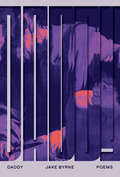
DADDY
Par Jake Byrne. 2024
Featured on Quill & Quire's Fall PreviewIf you reloop trauma enough, does it make a danceable rhythm? If you get…
lost in physical sensation enough, does that make you free?DADDY is a powerful look at patriarchy, intergenerational trauma, and queer desire that seeks an unravelling of systems of control to reclaim vulnerability. At once confessional, playful, and sonically meticulous, Byrne's poems seek conversation with a voice in the mind that won't quiet. Cruel father figures dissolve into leather-clad muscle daddies on popper-scented dancefloors; the pain of the past sows the seeds of a joyful exploration of queer desire.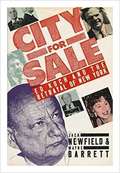
City For Sale: Ed Koch And The Betrayal Of New York
Par Jack Newfield, Wayne Barrett. 1988
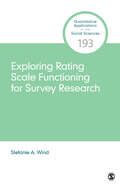
Exploring Rating Scale Functioning for Survey Research (Quantitative Applications in the Social Sciences)
Par Stefanie A. Wind. 2023
Items with ordered response categories are common in survey research, such as when respondents are asked how much they agree…
with certain statements. But how large are the differences between categories of response, and how well do they distinguish between respondents? This volume is the first to introduce the evaluation of rating scales to an audience of survey researchers. Evaluating Rating Scale Functioning for Survey Research provides researchers with an overview of rating scale analysis along with practical guidance on how to conduct such analyses with their own survey data. Author Stefanie A. Wind presents three categories of methods: Rasch models; non-Rasch Item Response Theory (IRT) models; and non-parametric models, together with practical examples. Tutorials, datasets, and software code (R and Facets) to accompany the book are available on the book’s website.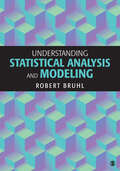
Understanding Statistical Analysis and Modeling
Par Robert H. Bruhl. 2018
Understanding Statistical Analysis and Modeling is a text for graduate and advanced undergraduate students in the social, behavioral, or managerial…
sciences seeking to understand the logic of statistical analysis. Robert Bruhl covers all the basic methods of descriptive and inferential statistics in an accessible manner by way of asking and answering research questions. Concepts are discussed in the context of a specific research project and the book includes probability theory as the basis for understanding statistical inference. Instructions on using SPSS® are included so that readers focus on interpreting statistical analysis rather than calculations. Tables are used, rather than formulas, to describe the various calculations involved with statistical analysis and the exercises in the book are intended to encourage students to formulate and execute their own empirical investigations.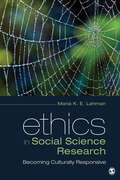
Ethics in Social Science Research: Becoming Culturally Responsive
Par Maria K. Lahman. 2018
Ethics in Social Science Research: Becoming Culturally Responsive provides a thorough grounding in research ethics, along with examples of real-world…
ethical dilemmas in working with vulnerable populations. Author Maria K. E. Lahman aims to help qualitative research students design ethically and culturally responsive research with communities that may be very different from their own. Throughout, compelling first person accounts of ethics in human research—both historical and contemporary—are highlighted and each chapter includes vignettes written by the author and her collaborators about real qualitative research projects.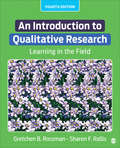
An Introduction to Qualitative Research: Learning in the Field
Par Sharon F Rallis, Gretchen B Rossman. 2017
The updated Fourth Edition of Rossman and Rallis’s popular introductory text leads the new researcher into the field by explaining…
the core concepts through theory, research, and applied examples. Woven into the chapters are three themes that are the heart of the book: first, research is about learning; second, research can and should be useful; and finally, a researcher should practice the highest ethical standards to ensure that a study is trustworthy. The Fourth Edition includes an elaborate discussion of systematic inquiry as well as a nuanced discussion of developing a conceptual framework.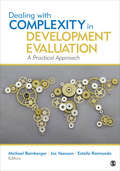
Dealing With Complexity in Development Evaluation: A Practical Approach
Par Michael Bamberger, Jos Vaessen, Estelle Raimondo. 2016
Recognizing that complexity calls for innovative, conceptual, and methodological solutions, this unique book offers practical guidance to policymakers, managers, and…
evaluation practitioners on how to design and implement complexity-responsive evaluations that can be undertaken in the real world of time, budget, data, and political constraints. Introductory chapters present comprehensive, non-technical overviews of the most common evaluation tools and methodologies, and additional content addresses more cutting-edge material. The book also includes six case study chapters to illustrate examples of various evaluation contexts from around the world.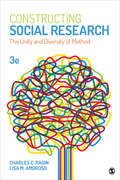
Constructing Social Research: The Unity and Diversity of Method (Sociology For A New Century Ser.)
Par Charles C. Ragin, Lisa M. Amoroso. 2019
The updated Third Edition of this innovative text shows the unity within the diversity of activities called social research to…
help students understand how all social researchers construct representations of social life using theories, systematic data collection, and careful examination of that data. The book tackles questions like "What is social research?", "How does it differ from journalism, documentary film-making, or laboratory research in the natural sciences?", and "What is the researcher′s obligation to those he or she is studying?" Updated throughout with new references and examples, this edition is designed to evoke challenging questions regarding the nature of representation and the ethical challenges facing social scientific researchers. The text moves beyond standard research challenges to push readers to see the complex relationships among ethics, ideas, evidence, and outcomes.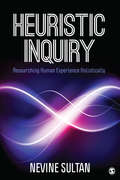
Heuristic Inquiry: Researching Human Experience Holistically
Par Nevine Sultan. 2019
Focused on exploring human experience from an integrative perspective, Heuristic Inquiry: Researching Human Experience Holistically presents heuristic inquiry as a unique…
phenomenologically aligned, experiential, and relational approach to qualitative research that is also rigorous and evidence based. The author describes a distinguishing perspective of this research that treats participants not as subjects of research but rather as co-researchers in an exploratory process marked by genuineness and intersubjectivity. Through the use of real-life examples illustrating the various processes of heuristic research, the book offers an understanding of heuristic inquiry that is straightforward and informal yet honors its creative, intuitive, and polydimensional nature. "A must-read for anyone interested in qualitative research." Graham Bright, York St John University, UK "This text provides a valuable service to novice and experienced researchers through its straightforward, yet complex and nuanced approach to heuristic inquiry." –Joseph McNabb, Northeastern University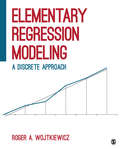
Elementary Regression Modeling: A Discrete Approach
Par Roger A. Wojtkiewicz. 2017
Elementary Regression Modeling builds on simple differences between groups to explain regression and regression modeling. User-friendly and immediately accessible, this…
book gives readers a thorough understanding of control modeling, interaction modeling, modeling linearity with spline variables, and creating research hypotheses that serve as a conceptual basis for many of the processes and procedures quantitative researchers follow when conducting regression analyses.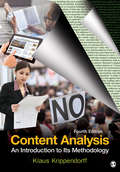
Content Analysis: An Introduction to Its Methodology
Par Klaus Krippendorff. 2019
What matters in people’s social lives? What motivates and inspires our society? How do we enact what we know? Since…
the first edition published in 1980, Content Analysis has helped shape and define the field. In the highly anticipated Fourth Edition, award-winning scholar and author Klaus Krippendorff introduces readers to the most current method of analyzing the textual fabric of contemporary society. Students and scholars will learn to treat data not as physical events but as communications that are created and disseminated to be seen, read, interpreted, enacted, and reflected upon according to the meanings they have for their recipients. Interpreting communications as texts in the contexts of their social uses distinguishes content analysis from other empirical methods of inquiry. Organized into three parts, Content Analysis first examines the conceptual aspects of content analysis, then discusses components such as unitizing and sampling, and concludes by showing readers how to trace the analytical paths and apply evaluative techniques. The Fourth Edition has been completely revised to offer readers the most current techniques and research on content analysis, including new information on reliability and social media. Readers will also gain practical advice and experience for teaching academic and commercial researchers how to conduct content analysis.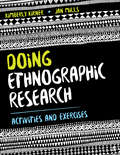
Doing Ethnographic Research: Activities and Exercises
Par Kimberly Kirner, Jan L. Mills. 2020
This workbook is loaded with exercises, how-to sections and checklists, all designed to serve as a supplemental support for students…
to apply the principles and concepts learned from the textbook it accompanies. With instructions and explanations written in a conversational style, it will help the student understand why the assignments are being used, why the skills they are developing are relevant and how the exercises relate to the textbook content.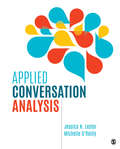
Applied Conversation Analysis: Social Interaction in Institutional Settings
Par Jessica Nina Lester, Michelle O′Reilly. 2019
Focusing on applied conversation analysis (CA), this timely book offers practical insights and guidelines for CA scholars studying social interactions…
in institutional settings. Written in an accessible style and packed with case studies, examples, activities, and practical tips, the book takes readers through the entire process of planning and carrying out an applied CA research study. By highlighting challenges, debates, and important questions, each chapter provides the theoretical foundation necessary for making informed decisions at every stage of a research project. The book is divided into three sections (context and planning, doing a project using conversation analysis, and disseminating your research) to mirror the research process.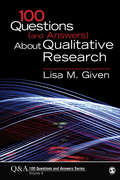
100 Questions (SAGE 100 Questions and Answers)
Par Lisa M. Given. 2016
Exploring 100 key questions (and answers) on the nature and practice of qualitative inquiry, this unique book addresses the practical…
decisions that researchers must make in their work, from the design of the study, through ethics approval, implementation, and writing. The book’s quick-scan, question-and-answer format make it ideal as a supplementary text or as a ready reference for graduate students preparing for comprehensive exams and writing research proposals, undergraduates in affiliated programs who will not be taking a primary course in qualitative research methods, and researchers working across disciplines in academic or practice environments.
Heuristic Inquiry: Researching Human Experience Holistically
Par Nevine Sultan. 2019
Focused on exploring human experience from an integrative perspective, Heuristic Inquiry: Researching Human Experience Holistically presents heuristic inquiry as a unique…
phenomenologically aligned, experiential, and relational approach to qualitative research that is also rigorous and evidence based. The author describes a distinguishing perspective of this research that treats participants not as subjects of research but rather as co-researchers in an exploratory process marked by genuineness and intersubjectivity. Through the use of real-life examples illustrating the various processes of heuristic research, the book offers an understanding of heuristic inquiry that is straightforward and informal yet honors its creative, intuitive, and polydimensional nature. "A must-read for anyone interested in qualitative research." Graham Bright, York St John University, UK "This text provides a valuable service to novice and experienced researchers through its straightforward, yet complex and nuanced approach to heuristic inquiry." –Joseph McNabb, Northeastern University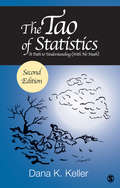
The Tao of Statistics: A Path to Understanding (With No Math)
Par Dana K. Keller. 2016
This Second Edition of The Tao of Statistics: A Path to Understanding (With No Math) provides a reader-friendly approach to…
statistics in plain English. Unlike other statistics books, this text explains what statistics mean and how they are used, rather than how to calculate them. The book walks readers through basic concepts as well as some of the most complex statistical models in use. The Second Edition adds coverage of big data to better address its impact on p-values and other key concepts; material on small data to show readers how to handle data with fewer data points than optimal; and other new topics like missing data and effect sizes. The book’s two characters (a high school principal and a director of public health) return in the revised edition, with their examples expanded and updated with reference to contemporary concerns in the fields of education and health.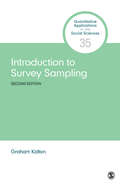
Introduction to Survey Sampling (Quantitative Applications in the Social Sciences #35)
Par Graham Kalton. 2021
Sample design is key to all surveys, fundamental to data collection, and to the analysis and interpretation of the data.…
Introduction to Survey Sampling, Second Edition provides an authoritative and accessible source on sample design strategies and procedures that is a required reading for anyone collecting or analyzing survey data. Graham Kalton discusses different types of probability samples, stratification (pre and post), clustering, dual frames, replicates, response, base weights, design effects, and effective sample size. It is a thorough revision and update of the first edition, published more than 35 years ago. Although the concepts of probability sampling are largely the same, there have been important developments in the application of these concepts as research questions have increasingly spanned multiple disciplines, computers have become central to data collection as well as data analysis, and cell phones have become ubiquitous, but response rates have fallen, and public willingness to engage in survey research has waned. While most of the volume focuses on probability samples, there is also a chapter on nonprobability samples, which are becoming increasingly important with the rise of social media and the world wide web.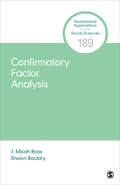
Confirmatory Factor Analysis (Quantitative Applications in the Social Sciences)
Par J. Micah Roos, Shawn Bauldry. 2022
Measurement connects theoretical concepts to what is observable in the empirical world, and is fundamental to all social and behavioral…
research. In this volume, J. Micah Roos and Shawn Bauldry introduce a popular approach to measurement: Confirmatory Factor Analysis (CFA). As the authors explain, CFA is a theoretically informed statistical framework for linking multiple observed variables to latent variables that are not directly measurable. The authors begin by defining terms, introducing notation, and illustrating a wide variety of measurement models with different relationships between latent and observed variables. They proceed to a thorough treatment of model estimation, followed by a discussion of model fit. Most of the volume focuses on measures that approximate continuous variables, but the authors also devote a chapter to categorical indicators. Each chapter develops a different example (sometimes two) covering topics as diverse as racist attitudes, theological conservatism, leadership qualities, psychological distress, self-efficacy, beliefs about democracy, and Christian nationalism drawn mainly from national surveys. Data to replicate the examples are available on a companion website, along with code for R, Stata, and Mplus.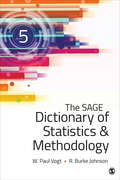
The SAGE Dictionary of Statistics & Methodology: A Nontechnical Guide for the Social Sciences
Par Robert Burke Johnson, W. William Vogt. 2016
Written in a clear, readable style with a wide range of explanations and examples, this must-have dictionary reflects recent changes…
in the fields of statistics and methodology. Packed with new definitions, terms, and graphics, this invaluable resource is an ideal reference for researchers and professionals in the field and provides everything students need to read and understand a research report, including elementary terms, concepts, methodology, and design definitions, as well as concepts from qualitative research methods and terms from theory and philosophy.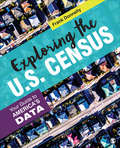
Exploring the U.S. Census: Your Guide to America’s Data
Par Francis P. Donnelly. 2020
Exploring the U.S. Census gives social science students and researchers alike the tools to understand, extract, process, and analyze data from…
the decennial census, the American Community Survey, and other data collected by the U.S. Census Bureau. Donnelly′s text provides a thorough background on the data collection methods, structures, and potential pitfalls of the census for unfamiliar researchers, collecting information previously available only in widely disparate sources into one handy guide. Hands-on, applied exercises at the end of the chapters help readers dive into the data. Along the way, the author shows how best to analyze census data with open-source software and tools. Readers can freely evaluate the data on their own computers, in keeping with the free and open data provided by the Census Bureau. By placing the census in the context of the open data movement, this text makes the history and practice of the census relevant so readers can understand what a crucial resource the census is for research and knowledge.